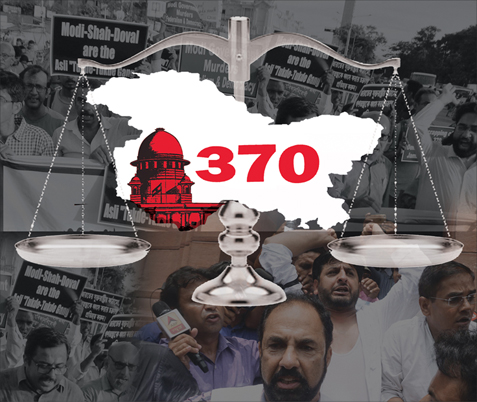The Union of India on Thursday apprised the Supreme Court that the status of Jammu and Kashmir as a Union Territory was only a temporary phenomenon, however, it refused to provide an exact timeline for conversion to a full-fledged state.
Appearing for the Central government, Solicitor General Tushar Mehta said the Central government was prepared for elections but the timing of these polls and whether they should commence at the panchayat or district level, would be determined by the UT administration and the Election Commission of India (ECI).
SG Mehta made the submission before the Constitution Bench of Chief Justice of India (CJI) DY Chandrachud, Justice Sanjay Kishan Kaul, Justice Sanjiv Khanna, Justice BR Gavai and Justice Surya Kant, which continued hearing for the 13th day, the petitions challenging the abrogation of Article 370.
Apprising the Apex Court about the steps taken by the Centre, the SG informed the Constitution Bench that in January 2022 alone, 1.8 crore tourists visited Jammu and Kashmir, while the number crossed the one crore mark in 2023.
He pointed out that the Union government could only take these steps till J&K was a UT.
The SG said the Centre was ready for elections, but the dates would be decided by the State Election Commission and the ECI.
The poll bodies would also decide which level of elections would be held first, panchayat or district, he added.
On the 12th day of hearing on Tuesday, the Supreme Court had rejected the Central government’s arguments that it abrogated Article 370 and bifurcated Jammu and Kashmir into two Union Territories to end the problem of militancy and separatism faced by the erstwhile state.
The Apex Court observed that various parts of the country had faced the problems of militancy and separatism, such as north-eastern States and even Punjab.
Referring to the recent ethnic clashes in Manipur, the Constitution Bench told Solicitor General Tushar Mehta, appearing for the Centre, that he cannot say Jammu and Kashmir would be treated differently just because it was a border state.
The SG replied that J&K had faced the consistent and repeated situation over the decades. One part of its territory was occupied by Pakistan, known as PoK.
Pointing out that the nation has faced this problem for decades, the SG said this was a knee-jerk decision, but a policy matter, which was taken after keeping all factors in mind.
The Central government further submitted that Jammu and Kashmir has been granted the status of a Union Territory only for the time being, adding that its statehood would be restored at the right time. However, Ladakh would remain a Union Territory, it noted.
The Constitution Bench said that even if the role of the J&K Constituent Assembly with regard to the status of Article 370 was interpreted as a recommendatory one, it did not mean that the Assembly could be overridden by the President of India.
Attorney General R. Venkataramani, also appearing for the Central government, said that the abrogation of Article 370 enabled different people to contest elections in Jammu and Kashmir. He added that the move marked the finality of the region’s integration into the Union of India.
(Case title: In Re: Article 370 of the Constitution)


